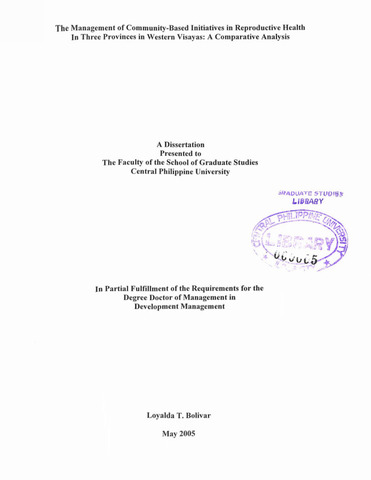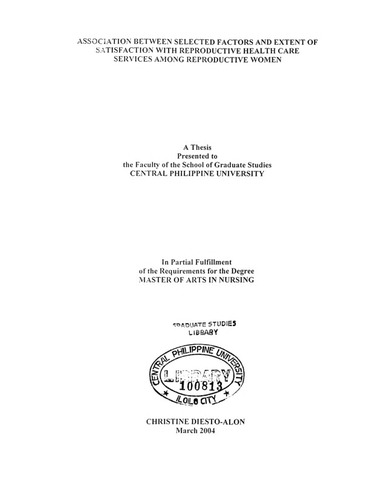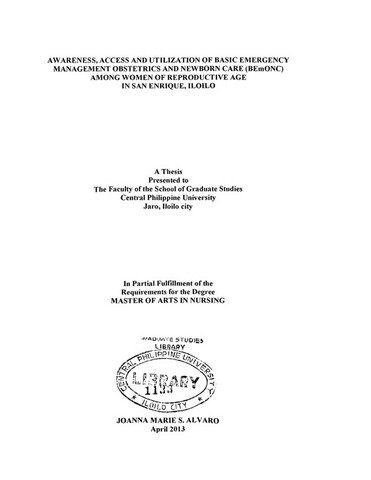Perceived wellness among the teaching personnel in a private higher education institution: Status, challenges, and practices as bases for the formulation of a wellness program
| dc.contributor.adviser | Loyola, Ma. Lulu L. | |
| dc.contributor.author | Alicante, Jelvit Amor C. | |
| dc.date.accessioned | 2023-01-09T23:48:22Z | |
| dc.date.available | 2023-01-09T23:48:22Z | |
| dc.date.issued | 2022-06 | |
| dc.identifier.citation | Alicante, J. A. C. (2022). Perceived wellness among the teaching personnel in a private higher education institution: Status, challenges, and practices as bases for the formulation of a wellness program (Unpublished Doctoral dissertation). West Visayas State University, La Paz, Iloilo City. | en_US |
| dc.identifier.uri | https://hdl.handle.net/20.500.12852/2413 | |
| dc.description | Abstract only | en_US |
| dc.description.abstract | This survey research aimed to identify the perceived wellness status, wellness challenges, and wellness practices among the 124 randomly selected full-time teaching personnel in a private higher education institution. Quantitative data were gathered using three duly validated researcher-made survey questionnaires. The descriptive statistics used were frequency count, percentage analysis, means, and standard deviation while the inferential statistics utilized were the t-test for independent samples, the One-way analysis of variance, and Pearson's r, set at .05 alpha. Results revealed that the respondents had excellent wellness status; the environmental, financial, and physical aspects were their predominant wellness challenges while the spiritual, social, and intellectual aspects were their least predominant wellness challenges. They had a marginal level of wellness challenges in the environmental, physical, financial, occupational, and emotional areas and a low level of wellness challenges in the intellectual, social, and spiritual aspects. The emotion-oriented practices were their most predominant wellness practices and avoidance strategy practices were their least predominant wellness practices. They had a very high extent of emotion-oriented practices and task-oriented practices and a high extent of avoidance strategy practices. They differed significantly in their wellness status when classified according to educational attainment and in their level of wellness challenges when grouped according to sex. No significant differences existed in the wellness status when grouped according to sex and civil status and no significant differences were noted in the wellness challenges when they were classified according to civil status and educational attainment and in the extent of their wellness practices when grouped according to sex, civil status, and educational attainment. The teaching personnel's wellness status, wellness challenges, and wellness practices were positively and significantly correlated. Finally, as an offshoot of the study, a wellness program was prepared and jury validated. | en_US |
| dc.format.extent | xiii, 185 leaves | en_US |
| dc.language.iso | en | en_US |
| dc.subject.ddc | GSL Theses 371.4072 Al42 | en_US |
| dc.subject.lcsh | Employee health promotion | en_US |
| dc.subject.lcsh | Health | en_US |
| dc.subject.lcsh | Health promotion--Evaluation | en_US |
| dc.subject.lcsh | Health promotion | en_US |
| dc.subject.lcsh | Teachers--Health and hygiene | en_US |
| dc.subject.lcsh | College teachers | en_US |
| dc.subject.lcsh | College teachers--Health and hygiene | en_US |
| dc.subject.lcsh | Teachers | en_US |
| dc.title | Perceived wellness among the teaching personnel in a private higher education institution: Status, challenges, and practices as bases for the formulation of a wellness program | en_US |
| dc.type | Dissertation | en_US |
| dcterms.accessRights | Not publicly accessible | en_US |
| dc.description.bibliographicalreferences | Includes bibliographical references | en_US |
| dc.contributor.chair | Montaño, Hilda | |
| dc.contributor.committeemember | Palmos, Rejie F. | |
| dc.contributor.committeemember | Abioda, Luis A. | |
| dc.contributor.committeemember | Amantillo, Victor A. Jr. | |
| dc.contributor.department | Graduate School, College of Education | en_US |
| dc.description.degree | Doctor of Philosophy in Education (Psychology and Guidance) | en_US |
Files in this item
This item appears in the following Collection(s)
-
Dissertations [10]





